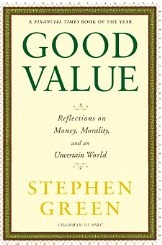Lord Stephen Green, chair of a recent Church of England report on leadership development, is under the spotlight for his own leadership of HSBC during 2003-2010, now that the bank is facing renewed criticism and questions about tax avoidance schemes.
The Guardian newspaper labels Green, “the ethical banker with questions to answer.”
An ordained Church of England minister, Lord Green published a book in 2009 entitled Good Value: Reflections on Money, Morality and an Uncertain World. It preached that business leaders should behave not just legally but ethically, going beyond “what you can get away with”.
Today, Green faces awkward questions over the culture of lax controls and failures in compliance at HSBC’s Swiss bank. The Geneva subsidiary that routinely allowed clients to withdraw very large sums of cash and that colluded with some to conceal undeclared “black” accounts was created on Green’s watch.
Ekklesia comments on the controversy and on the Green Report.
The Green Report was heavily criticised, not least because it was not adequately discussed before some of its proposals began to be put in place. It seeks to develop the potential of current bishops and deans and “clergy of exceptional leadership potential” through programmes run by a business school.
It took a very different approach from Senior Church Leadership: A resource for reflection, issued by the Faith and Order Commission in January 2015, which critically examined theological issues around authority and responsibility.
The Green Report was “unaware of critiques of management, executive authority, and leadership which abound in academic literature, it is steeped in its own uncritical use of executive management-speak”, wrote Martyn Percy (Dean of Christ Church, Oxford, and formerly Principal of Ripon College Cuddesdon) in the Church Times newspaper.
Archbishop of Canterbury Justin Welby, himself a former oil executive, may have made oblique reference to the Green report’s critics during his presidential address to Synod this morning.
Joy and delight in the love of God is at the heart of Christian witness, but the experience of many of us – I dare say most of us – is that, instead of joy and delight, evangelism and witness bring nervousness, uncertainty and guilt.
The strategic response to this is clearly for a long-term, iterative and interactive, metric-based, evidence generated development of competencies across the widest possible range of stakeholders in order to achieve maximum acceleration of disciple input with the highest possible return on effort and capital employed. [Laughter].
That last paragraph is, of course, complete rubbish. To be honest, I just put it in in order to reassure you, as it is well known that I am in fact a businessman who put on the wrong clothes this morning. [Laughter].
According to the Guardian, Green has declined to answer questions about HSBC business, but an older entry in the Reference for Business website describes how he integrated his priesthood with his job as CEO at the bank.
Green was an ordained, unpaid Anglican Church minister and often preached in the church near his London home. Colleagues noted that he sometimes composed his sermons while flying to HSBC’s outposts around the world. In his book and his sermons he stressed that businesses like HSBC could demonstrate their moral standing by always acting responsibly toward employees, customers, and the local communities. Referring to how his Christian beliefs affected his management style, he told Institutional Investor , “There’s a very clear focus on doing the right kind of business, on long-term relationships with clients, on honesty and transparency” (April 2003).
Posted by Rosalind Hughes

